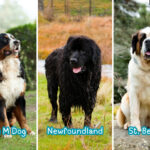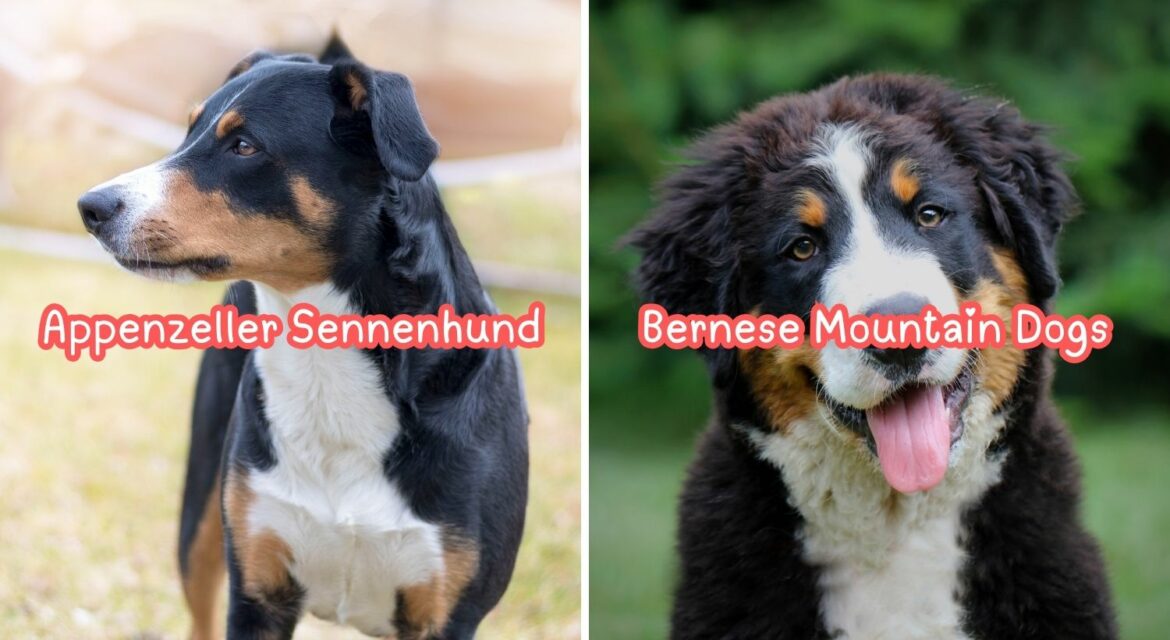 6 May
6 MayAppenzeller Sennenhund vs Bernese Mountain Dog
Choosing the right dog breed can be a delightful yet challenging decision, especially when considering breeds as charming and distinct as the Appenzeller Sennenhund and the Bernese Mountain Dog. Whether you’re a bustling family seeking a furry companion or a single pet owner looking for a loyal friend, understanding these breeds’ differences is crucial. Both known for their robust build and amiable nature, the Appenzeller Sennenhund and the Bernese Mountain Dog bring unique traits to the table.
In this guide, we’ll help you navigate these differences, ensuring you make a well-informed decision on which breed might be the right fit for your home and lifestyle.
Appenzeller Sennenhund vs Bernese Mountain Dog: Which Is Right For You?
The Appenzeller Sennenhund and the Bernese Mountain Dog’s main differences are their size, lifespan, and temperament. The Appenzeller Sennenhund is medium-sized, agile, and known for its high energy and protective nature, making it suitable for active owners who require a vigilant companion. On the other hand, the Bernese Mountain Dog is larger, has a shorter lifespan, and displays a calm and affectionate temperament, ideal for families seeking a gentle and friendly pet.
| Feature | Appenzeller Sennenhund | Bernese Mountain Dog | Ideal Owner |
|---|---|---|---|
| Size | Medium (18.5-22 inches at the shoulder) | Large (23-27.5 inches at the shoulder) | – Appenzeller: Those with limited space – Bernese: Those with more room. |
| Weight | 48-70 pounds | 70-115 pounds | – Appenzeller: Prefer smaller, agile dogs – Bernese: Prefer larger, sturdy dogs. |
| Lifespan | 12-15 years | 6-8 years | – Appenzeller: Looking for longer companionship – Bernese: Okay with a shorter, deep bond. |
| Energy Level | High | Moderate to high | – Appenzeller: Active owners who enjoy regular exercise – Bernese: Owners who can provide daily exercise, but less intense. |
| Temperament | Loyal, Energetic, Protective | Affectionate, Calm, Gentle | – Appenzeller: Those needing a protective dog – Bernese: Families with kids or other pets. |
| Grooming Needs | Moderate (weekly brushing) | High (frequent brushing, sheds heavily) | – Appenzeller: Less time for grooming – Bernese: Ready to invest time and effort in grooming. |
| Health Concerns | Generally healthy, some hereditary issues | Prone to serious health issues like cancer and joint problems | – Appenzeller: Prefer a generally healthier breed – Bernese: Prepared for potential health challenges. |
| Training | Highly trainable, needs consistent leadership | Highly trainable, sensitive to harsh treatment | – Appenzeller: Experienced dog trainers – Bernese: Gentle, first-time owners. |
| Socialization Needs | High (can be territorial) | Moderate (naturally friendly) | – Appenzeller: Willing to invest time in socialization – Bernese: Prefer a naturally sociable dog. |
Both breeds require consistent training and socialization, with the Bernese Mountain Dog needing more intensive grooming due to its heavy shedding. Choosing between these two depends on your living space, lifestyle, and the level of physical and grooming care you can commit to, ensuring a compatible match for your home environment.
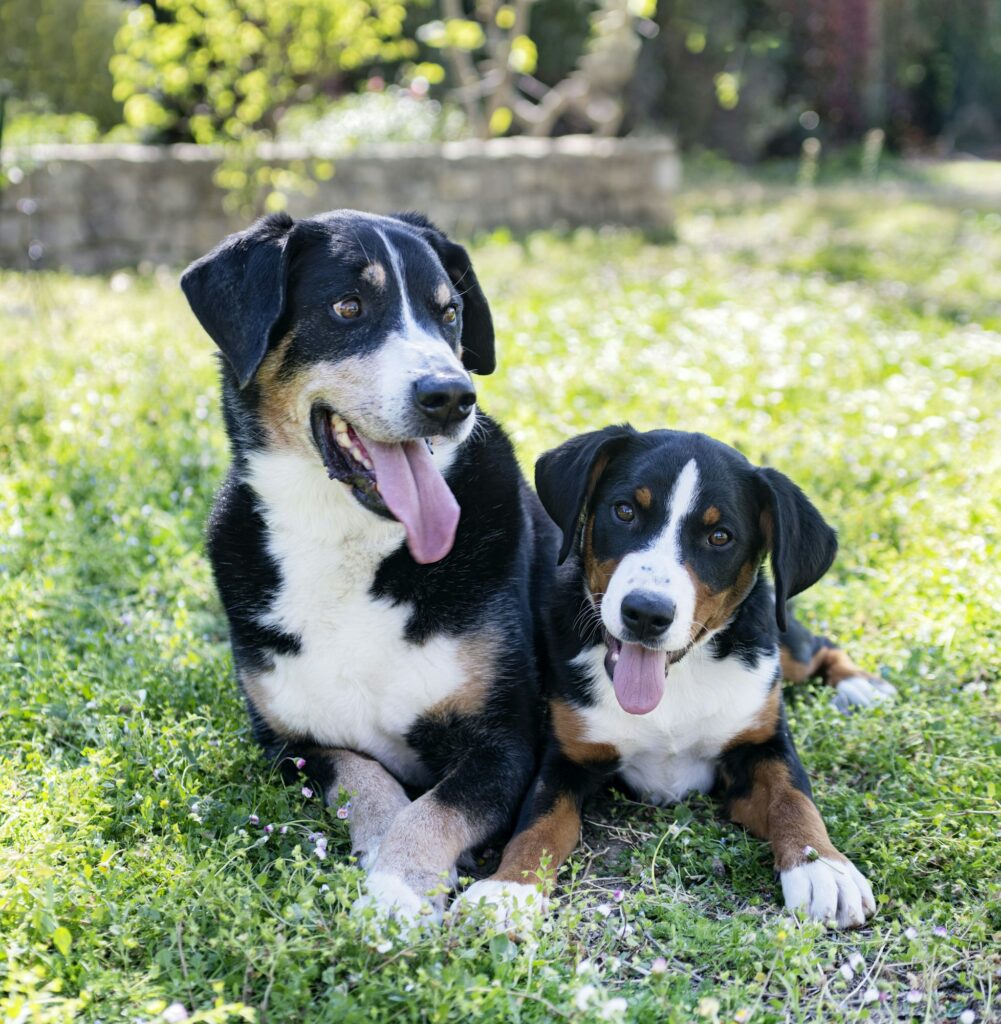
Appenzeller Sennenhund
The Appenzeller Sennenhund hails from Switzerland’s rugged landscapes, specifically the Appenzell region, where it was originally used as a herding dog. Its history dates back several centuries, and its primary role involved herding cattle, pulling carts, and serving as a general farm dog.
The breed is one of the four regional breeds of Sennenhund-type dogs from the Swiss Alps, each named after the regions they originated from. Known for their versatility and endurance, the Appenzeller Sennenhund was also used for guarding properties, showcasing their protective instincts.
Despite their long history, this breed was officially recognized only in the late 19th century, reflecting their enduring presence and importance in Swiss rural life.
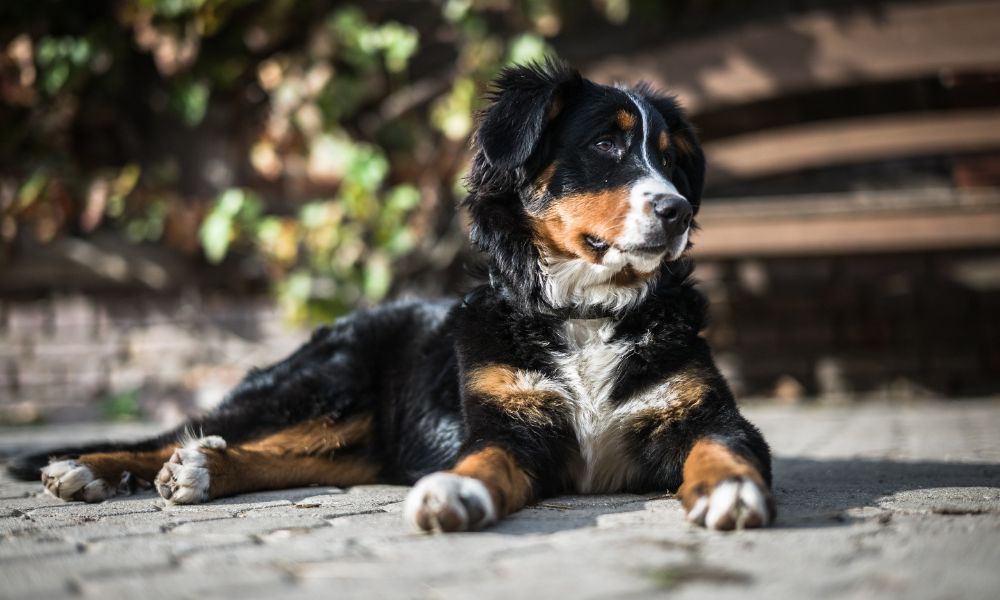
Bernese Mountain Dogs
Originating from the Bern region in Switzerland, the Bernese Mountain Dog is another member of the Swiss Sennenhund family, bred for similar tasks such as herding cattle, pulling carts, and being a steadfast companion to farmers.
Known in German as the “Berner Sennenhund,” this breed was essential for the all-around farm help in the harsh Alpine conditions, where strength and durability were as vital as a good temperament. Their striking tri-color coat and gentle eyes have made them a favorite not just in their native land but globally. The breed gained formal recognition in the early 20th century and has since become renowned for its gentle nature and strong build, making it a popular choice for a family pet today.
Both the Appenzeller Sennenhund and the Bernese Mountain Dog share a common heritage of Swiss working dogs, revered for their intelligence, strength, and loyalty. These breeds highlight the cultural importance of working dogs in Swiss history and continue to be beloved companions in homes around the world.
Appenzeller Sennenhund vs Bernese Mountain Dog: Who Should Choose Which Breed?
When deciding between an Appenzeller Sennenhund and a Bernese Mountain Dog, potential dog owners should consider their lifestyle, living environment, and what they seek in a dog’s personality and maintenance needs.
Here’s a detailed guide to help you determine which breed might be the right fit for you.
Who Should Choose an Appenzeller Sennenhund?
- Active Individuals or Families: The Appenzeller Sennenhund thrives in environments where they can be physically active. If you enjoy daily jogs, hikes, or need a companion for adventurous outdoor activities, this breed’s high energy and stamina will be a perfect match.
- Experienced Dog Owners: This breed requires consistent, firm training and does well with owners who understand dog behavior and are experienced in training. Their protective nature makes them excellent watchdogs, but they also need proper socialization to manage their territorial instincts.
- Those With Adequate Space: While not as large as the Bernese, Appenzellers still need space to move around. A home with a backyard or access to open spaces would be ideal for this breed to burn off their energy.
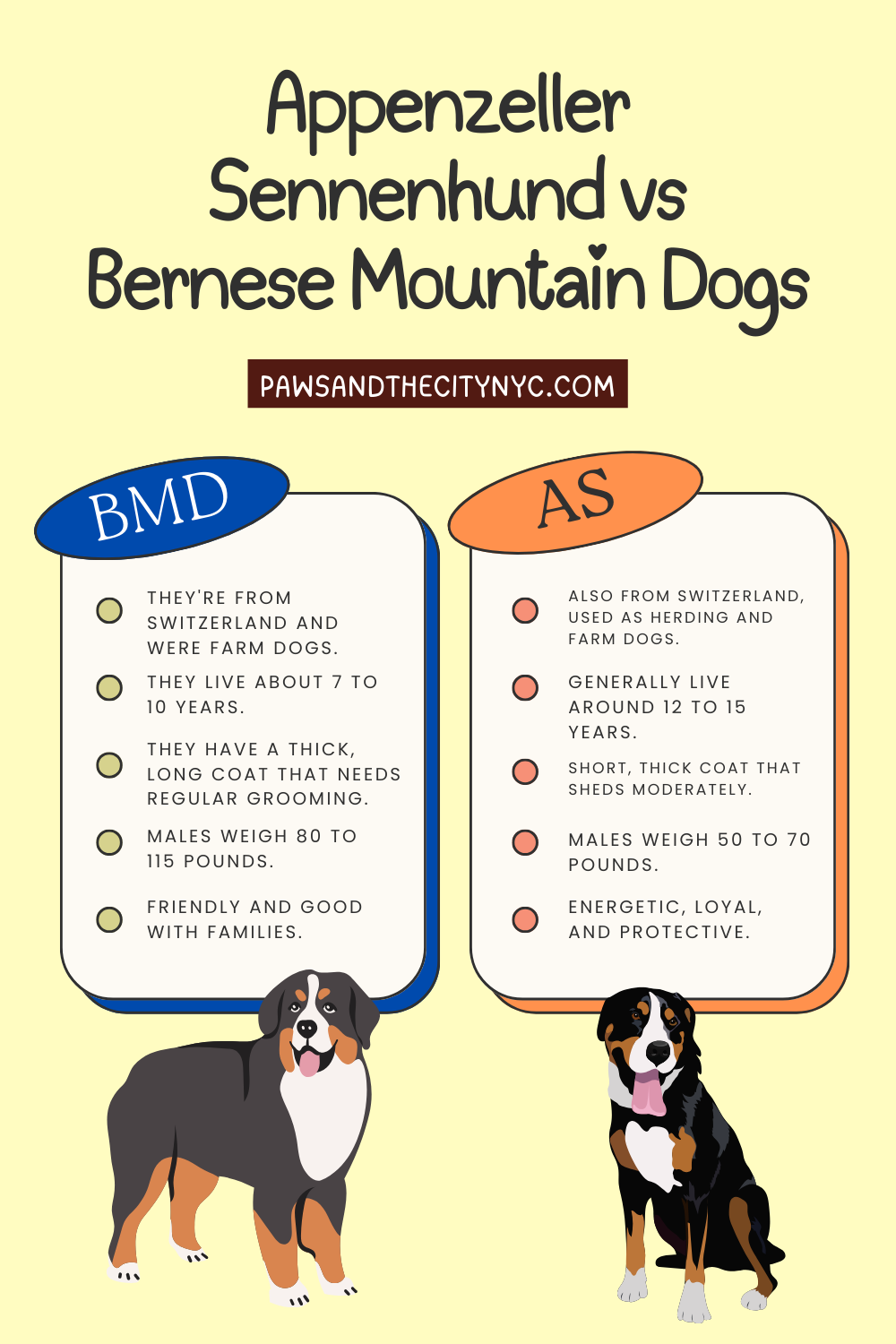
Who Should Choose a Bernese Mountain Dog?
- Families with Children: Known for their calm and gentle disposition, Bernese Mountain Dogs are fantastic with children. They are patient and tolerant, making them excellent family pets where their size and gentleness can be truly appreciated.
- Owners Looking for a Loyal Companion: If you value a deep, emotional connection with your pet, the Bernese Mountain Dog’s affectionate nature and desire to bond with family members make them a heartwarming addition to any home.
- Those Who Can Manage Health and Grooming Needs: Potential owners should be prepared for frequent grooming due to the Bernese’s heavy shedding. Additionally, awareness and readiness to manage potential health issues common in larger breeds, like hip dysplasia and shorter lifespan, are necessary.
Key Considerations for Both Breeds
- Living Conditions: Both breeds do best in homes with plenty of space to move about. Apartment living is not ideal unless regular, extensive exercise is part of the routine.
- Time Commitment: Both dogs require time and attention from their owners for exercise, training, and emotional connection. Ensuring you have the time to give these dogs the care they need is crucial.
- Climate: The Bernese Mountain Dog’s thick coat makes them more suited to cooler climates, whereas the Appenzeller can adapt to somewhat more varied temperatures. Consider your local climate when choosing between these breeds, as comfort levels can impact their health and happiness.
Ultimately, the choice between an Appenzeller Sennenhund and a Bernese Mountain Dog will depend on matching the dog’s needs with the owner’s ability to meet them. Both breeds offer unique traits that, when aligned with the right owner and home environment, can lead to a rewarding and fulfilling relationship.




